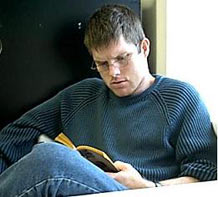 Monday, May 02, 2005
Monday, May 02, 2005
......Back from Integrales 2005
I have finally returned to the midwest after attending rehearsals and performances at the University of Southern Mississippi's Integrales New Music Festival. The inaugural year of the festival consisted of only one evening concert. The turnout was very good. The audiences at USM are known for being conservative so it was very encouraging to see the nice turnout.
[Since the turnout was so positive, Integrales 2006 will occupy an entire weekend!]
The concert featured twelve works by ten different composers.
The program:
Sequenza for Solo Flute - Luciano Berio
Sic Mea Fata for a capella choir - Alan Theisen
Three Dickinson Poems for a capella choir - J.D. Frizzell
Figment No. 2 "Juggler's Fancy" for solo violin - Everette Minchew
Esprit Rude/Esrit Doux for flute and clarinet - Elliott Carter
Variations on a Bach theme for antiphonal saxophone quartets - Marcus Ballard
-intermission-
Vermont Counterpoint for eleven flutes - Steve Reich
Tempo di Ciaconna from Violin Sonata - Bela Bartok
Four Songs - Berg
Three Dickinson Songs for soprano, double bass and piano - Juan Carlos Pena
Sequenza VIIb fo sorano saxophone - Berio
Hydra for wind sextet - Minchew
All of the performers were students and faculty of USM.
Samantha Neal gave a very invigorating performance of my solo violin work, Figment No. 2 "Juggler’s Fancy". (Just in case anyone was wondering about the title it is a reference to one of Sam’s favorite pastimes: juggling.) Juggler is a challenging work, and the audience had a very positive reaction to the piece.
The second of my works to be performed was Hydra for wind sextet (fl, ob, cl, a sax, hn, bsn). Hydra concluded the concert. The work was composed for saxophonist/composer, Marc Ballard. The perfomers gave a very energizing performance of this very aggressive piece. I was on the edge of my seat the whole time. [Not because I was nervous but because the performance was very exciting.] I only wish the work could have been louder.
There was a very interesting occurrence during the performance of Hydra.....an audience member's hearing aid began making very weird feedback-like noises. The noise became very loud during parts of Hydra. It did not interrupt the performance it just created an impromptu electronic accompaniment. I would like to think that it was all of the multiphonics in my work that set the woman's hearing aid into hyperactive Poeme Electronique-mode. It was really bizarre.
Later, I made the joke that next year on Integrales 2006 I will compose a work for 40 hearing aids. (I really liked some of the sounds being created by the hearing aid problem.)
I have more to post later about the audience's reaction to the concert.
posted by Everette Minchew
9:33 PM
|
|
 Composer Everette Minchew (born 1977) is consistently active in the creation, performance, and promotion of contemporary music. Moderately prolific, his catalogue includes small chamber pieces for violin, piano, various wind instruments, harpsichord and electronic music. Current commissions include a string trio and an opera based on an 11th-century crusades tale.
His earliest musical training came at the age of eleven when he began playing alto saxophone; it wasn’t long until he began his first attempts in composition.
Composer Everette Minchew (born 1977) is consistently active in the creation, performance, and promotion of contemporary music. Moderately prolific, his catalogue includes small chamber pieces for violin, piano, various wind instruments, harpsichord and electronic music. Current commissions include a string trio and an opera based on an 11th-century crusades tale.
His earliest musical training came at the age of eleven when he began playing alto saxophone; it wasn’t long until he began his first attempts in composition.
He received a Bachelor’s Degree in Music History from the University of Southern Mississippi, where he studied saxophone under world-renowned soloist, Lawrence Gwozdz.
Fearing that traditional university training would hinder his development as a progressive composer, he abandoned the idea of formal lessons in favor of an intense private study of modern masterworks.
Minchew's works are characterized by their intense timbral explorations and brutal dissonance. That is not to say, however, that the compositions are devoid of beauty. In the first of the Two Brief Pieces, for example, the harpsichord chimes stringent yet haunting chords evoking a sense of loss.
Other pieces, like the Figment No. 2 "Juggler's Fancy" play upon the kaleidoscopic interaction between timbres and tones. The rapid alternation of pizzicato, arco bowing, and extreme glissandi remind the listener of Xenakis coupled with a Berio Sequenza. Minchew's Invention "Two-Part Contraption" for piano owes much to Ligeti's etudes and boogie-woogie jazz.
His music has been performed around the United States, and he was the featured composer at the 2005 Intégrales New Music Festival in Hattiesburg, Mississippi.
He currently resides in Hattiesburg, Mississippi with his wife, Cheryl.
CONTACT INFORMATION
| |



